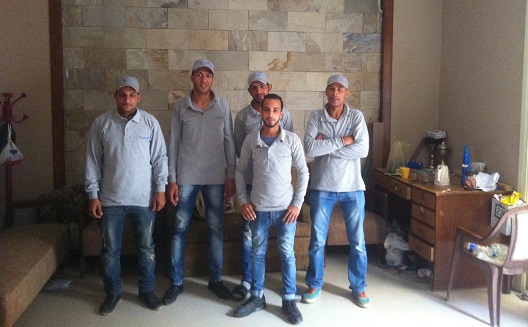FilKhedma puts tradesmen at your fingertips


Omar Ramadan in his still-spartan new digs in New Cairo. (Images via Filkhedma)
Home maintenance service Filkhedma has just moved into a new office in New Cairo: there’s still a lot of empty space, but it’s a marker of just how much founder Omar Ramadan expects the company to grow in the next eight months.
Ramadan started Filkhedma (‘at your service’) in September 2014 - not because home maintenance was his core passion, but because a job in an investment bank and a half-done MBA turned him off the corporate life. He wanted to start his own business and the field didn’t matter.
The original idea was to build a marketplace connecting customers to providers. But home maintenance is a more diverse, complicated business than, for instance, taxi hailing. Ramadan realised he had to build the service himself before being able to grow a genuine marketplace for home services.
Taskty is one of the only competitors in the Egyptian market, which offers home maintenance services, among many others from cleaning to photography.
“I thought home maintenance was where you can produce the biggest impact,” he said, explaining his choice. He’d done a market study before launching into the sector, and roughly estimated the market in Cairo alone to be worth $225 million to $338 million.
Running the investment gauntlet
Investors appear to agree with that assessment, and with Ramadan’s growth expectations.
Ramadan said was finalising the details of a deal with Egyptian investor KI Angels, although was not ready to disclose the sum involved.
Earlier, he’d been in talks with the Egyptian-American Enterprise Fund for, he said, a sum four times larger than that from KI Angels, only to hear after 10 months of negotiation that the organisation was stopping almost all its investment activities.
The fund, however, said the terms of the investment had changed and was still investing in Egyptian companies.
The money will go on marketing, including a series of mobile kiosks where services can be ordered and simple products such as light bulbs sold. “The customer is out here, the key is raising awareness convincing him to try something new.”

Five of Filkhedman's 10 tradies, in company uniform.
Ending the ‘phone a friend’ system
Ramadan said Cairo home maintenance usually worked like this: if something breaks, usually the doorman will try to fix it but if he can’t, he’ll call in a friend. That meant people ended up with an unknown, often unqualified person in their house, providing an unreliable service at a random price.
Instead, Filkhedma hires out 10 tradesmen qualified in plumbing, electrical work, carpentry and air conditioner maintenance. They’re available daily only in the Cairo suburbs of New Cairo, Maadi and Heliopolis, so far, between 9-5 and bookable online or over the phone.
The technicians arrive within an hour window of an agreed time, clean shaven and wearing a Filkhedma shirt. When late, EGP 30 (US$3.38) is knocked off the fixed-price fee, and follow-up customer satisfaction calls are the rule.
Ramadan also requires his tradesmen buy a motorcycle, which he rents from them at a price close to the amount they would have to pay on monthly installments anyway. In this way, his employees acquire a motorcycle almost for free and Ramadan ensures the speed and mobility of his team.
The problems with starting from scratch
To start with finding qualified tradesmen was difficult, but Ramadan feels he has sorted this out for the moment: “at least at this scale. When we have 100 technicians it becomes a different story.”
The tradesmen are trained by Filkhedma and offered a fixed salary, plus a monthly bonus based on customer feedback.
Another issue was pricing.
“Pricing [of home maintenance services] is completely random. When I did pricing research, nobody had any idea what the market price is. How can I come with a price for our service when no one knows what they should pay?” Ramadan said.
Regional ambition
Ramadan has bootstrapped so far, spending between $56,000-68,000 on the business from his own savings, and his growth plans are ambitious - one reason why the team of 16 needed a new office (besides the call center, technicians and Ramadan himself, there’s the chief maintenance engineer, the driver for the company van, and an accountant).
He wants to grow from 400 maintenance orders a month, or just over one job a day for his tradesmen, to 1500 by the year-end - a 275 percent increase. He’s launching operations in the North Coast, where many well-off Egyptians tend to spend summer, and expects high growth rates over summer because of the need for air conditioning services.
Another opportunity lies in B2B services. Ramadan is talking to IKEA and furniture mall Hanimex to provide maintenance services and already has an agreement with sinks and toilets seller Duravit to be the recognized servicer of their products.
In the longer term, Ramadan envisages an operation spanning Cairo, Alexandria and a third city in Egypt, and he’s in talks to replicate the service in Saudi Arabia.
Editor's note: this article has been amended to include a comment received after publication from the Egyptian-American Enterprise Fund.
 Eduard Cousin is a freelance journalist based in Cairo, formerly managing editor of Daily News Egypt. He writes about the political and social developments in Egypt.
Eduard Cousin is a freelance journalist based in Cairo, formerly managing editor of Daily News Egypt. He writes about the political and social developments in Egypt.


